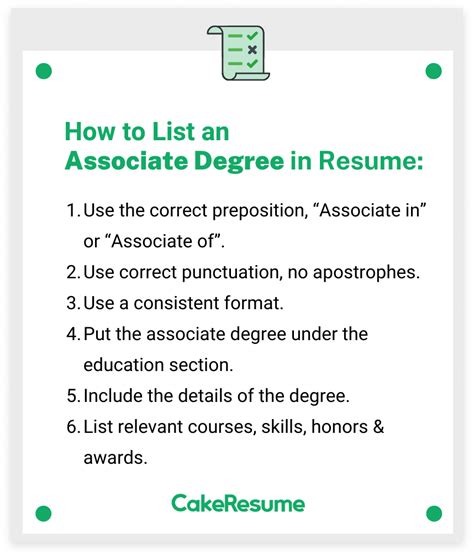Introduction

Highlighting your associate’s degree effectively on your resume can make a significant impact on your job search. It showcases your academic credentials and demonstrates your commitment to professional development. This guide will provide you with a detailed roadmap for including your associate’s degree on your resume, ensuring that it captures the attention of potential employers.
Including Your Degree Information
- Use the Education Section: Dedicate a specific section of your resume labeled “Education.”
- Full Degree Name: State the full name of your associate’s degree, such as “Associate of Science in Computer Science.”
- Institution and Location: Clearly list the name of the institution where you earned your degree and its location.
- Dates of Attendance: Indicate the start and end dates of your program. Use the format “MM/YY – MM/YY.”
- GPA (Optional): If your GPA is above 3.5, consider including it to showcase academic excellence.
Formatting and Style
- Font and Font Size: Use a professional font, such as Arial, Times New Roman, or Calibri, and maintain a font size between 10-12pt.
- Bold or Italicize Institution Name: Optionally, bold or italicize the name of the institution for emphasis.
- Conciseness: Keep the education section concise and limit it to one or two lines per degree.
- Proofread Carefully: Ensure that all information is accurate and free of any typos or grammatical errors.
Emphasizing Your Degree’s Relevance
- Tailor to Specific Roles: Highlight coursework or skills from your associate’s degree that are relevant to the jobs you’re applying for.
- Use Keywords: Incorporate keywords from job descriptions into your education section to increase visibility for applicant tracking systems.
- Quantify Accomplishments: If applicable, quantify your achievements during your program using numbers or percentages.
- List Relevant Projects: Include any projects or capstone experiences that demonstrate your practical application of skills.
Common Mistakes to Avoid
- Incorrect Formatting: Ensure that your degree information follows the appropriate formatting guidelines.
- Overcrowding the Section: Avoid cramming too much information into the education section. Keep it concise and focused.
- Omitting Important Information: Do not leave out essential details, such as the full degree name or dates of attendance.
- Using Informal Language: Maintain a professional tone throughout your resume, avoiding colloquialisms or slang.
- Plagiarism: Always cite any sources or research used in your education section to avoid ethical violations.
Why It Matters
- Credibility and Validation: Including your associate’s degree demonstrates your educational qualifications and adds credibility to your resume.
- Competitive Edge: In entry-level job markets, an associate’s degree can differentiate you from other candidates without a postsecondary degree.
- Preparation for Advancement: Many companies offer tuition assistance or advancement opportunities for employees with higher education credentials.
- Higher Earning Potential: According to the Bureau of Labor Statistics, individuals with an associate’s degree earn an average of 25% more per hour than those with only a high school diploma.
- Increased Job Security: Associate’s degrees provide valuable skills and knowledge that can make you more resilient to economic downturns.
Strategies for Success
- Highlight Transferable Skills: Emphasize the transferable skills gained during your program, such as problem-solving, critical thinking, and communication.
- Use Specific Examples: Provide specific examples of how you applied your skills in coursework or projects.
- Consider an Associate of Applied Science: An Associate of Applied Science (AAS) degree often focuses on practical, technical skills that can be directly applied to specific industries.
- Obtain Relevant Certifications: Supplement your associate’s degree with industry-recognized certifications to further enhance your qualifications.
- Network with Professionals: Attend industry events and connect with professionals in your field to gain insights and expand your job search.
| Degree | Institution | Location | Dates |
|---|---|---|---|
| Associate of Arts in Psychology | University of California, Los Angeles | Los Angeles, CA | 09/16 – 05/20 |
| Associate of Science in Computer Science | Rio Salado College | Phoenix, AZ | 06/18 – 12/21 |
| Degree | Relevant Coursework | Applicable Job Skills |
|---|---|---|
| Associate of Science in Engineering | Calculus, Physics, Thermodynamics | Problem-solving, Analytical thinking |
| Associate of Arts in Business Administration | Accounting, Marketing, Finance | Financial management, Stakeholder relations |
| Associate of Applied Science in Nursing | Medical Terminology, Pharmacology, Patient Care | Patient assessment, Treatment planning |
| Project | Quantification |
|---|---|
| Developed a website for a nonprofit organization | Increased website traffic by 25% |
| Led a team to design a mobile app | App downloaded over 50,000 times |
| Conducted research on renewable energy | Published findings in a peer-reviewed journal |
| Associate’s Degree Field | Transferable Skills |
|---|---|
| Computer Science | Problem-solving, Analytical thinking, Communication |
| Psychology | Empathy, Active listening, Conflict resolution |
| Business Administration | Financial literacy, Leadership, Collaboration |
| Nursing | Critical thinking, Time management, Patient care |
Conclusion
Effectively highlighting your associate’s degree on your resume is crucial for showcasing your credentials and increasing your chances of securing your desired job. By following the strategies outlined in this guide, you can craft a resume that accurately represents your academic achievements and demonstrates your readiness for professional success. Remember to tailor your resume to each job application, emphasizing the relevance of your degree to the specific role. With careful planning and a well-written resume, you can leverage your associate’s degree to advance your career aspirations.
